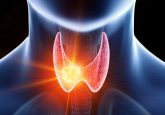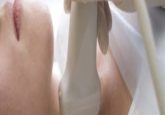Thyroid cancer detected in human urine samples by scent-trained dog
A study, presented at the Endocrine Society’s 97th annual meeting (5–8th March, San Diego, CA, USA), has reported that a dog correctly identified whether patients had thyroid cancer or not in 88.2% of cases. The dog is the first to be trained to differentiate thyroid cancer from benign thyroid disease by smelling a patient’s urine.
Frankie, the rescued male German Shepard-mix, was scent trained by study co-author Arny Ferrando from the University of Arkansas for Medical Sciences (UAMS; AR, USA), who taught him to recognize the smell of cancer in thyroid tissue obtained from multiple patients.
Within the study, 34 patients gave a urine sample at their first visit to UAMS thyroid clinic and then went on to have biopsies of suspicious thyroid nodules and surgery. The surgical pathology results diagnosed cancer in 15 patients and benign thyroid disease in 19 others.
A gloved dog handler then presented the urine samples one at a time to the dog, allowing it to smell them and then signal to the handler. Neither the gloved dog handler nor the study coordinator knew the cancer status of the 34 samples. Frankie alerted the handler to a cancer sample by lying down and alerted to a benign sample to turning away. Urine samples with a known cancer status were also presented to Frankie so that the handler could reward him for known correct answers.
In 30 of the 34 study samples (88.2%), the dog alerted correctly, with a true-positive rate of 86.7%. This meant that Frankie correctly identified 86.7% of pathology-proven thyroid cancers. The true-negative rate of the study was 89.5%, indicating that Frankie identified proven benign samples almost nine out of every ten times. Additionally, there were two false-negative results and two false-positives.
The findings reveal that canine scent detection exhibits accuracy only slightly less than that of fine-needle aspiration biopsy and has the advantage of being noninvasive and inexpensive. However, the technique remains in the early stages of research and treatment decisions are not yet being based on these findings.
The study’s senior investigator, Donald Bodenner (UAMS) commented: “Current diagnostic procedures for thyroid cancer often yield uncertain results, leading to recurrent medical procedures and a large number of thyroid surgeries performed unnecessarily.”
“Scent-trained canines could be used by physicians to detect the presence of thyroid cancer at an early stage and to avoid surgery when unwarranted,” continued Bodenner.
Bodenner and his team are moving forward with their research by collaborating with Auburn University College of Veterinary Medicine (AL, USA). The veterinary school is hoping to provide UAMS with two of its bomb-sniffing dogs, who will be trained to detect thyroid cancer using UAMS patient samples.
Source: University of Arkansas for Medical Sciences press release





